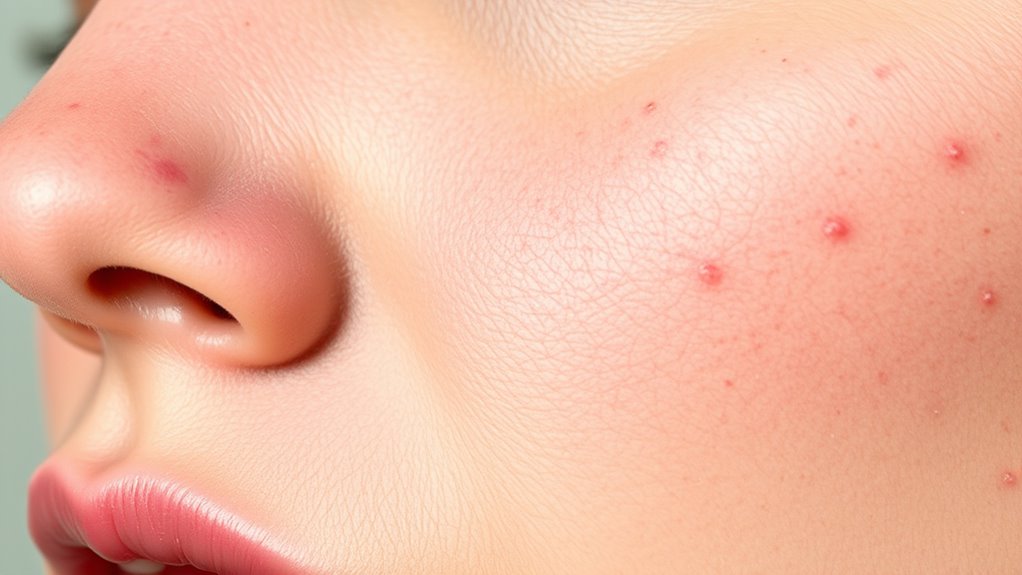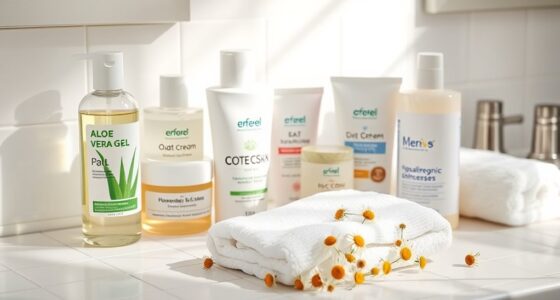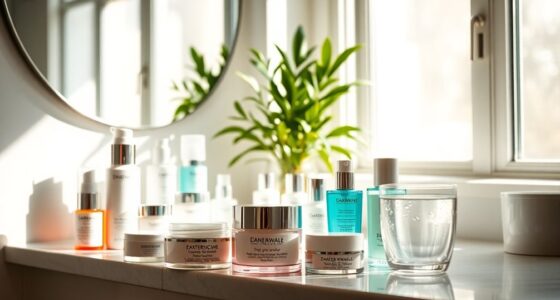To prevent and treat maskne, wear breathable, hypoallergenic masks and wash them regularly. Keep your skin clean with gentle cleansers and moisturize with oil-free products. Avoid harsh scrubbing and choose fabrics that reduce friction and moisture buildup. Use over-the-counter treatments like salicylic acid or benzoyl peroxide if needed. Maintain good mask hygiene and try skincare routines that support skin health. If symptoms persist, exploring professional advice can help—more tips to follow if you keep going.
Key Takeaways
- Choose breathable, natural fabrics like cotton and ensure proper mask fit to reduce friction and moisture buildup.
- Follow a gentle skincare routine with regular cleansing, moisturizing, and non-comedogenic products to prevent clogged pores.
- Wash cloth masks daily with hot water and use clean, hypoallergenic masks to maintain hygiene and reduce irritation.
- Use over-the-counter treatments containing benzoyl peroxide or salicylic acid for persistent maskne, or consult a dermatologist if needed.
- Maintain overall skin health through a balanced diet, hydration, stress management, and proper mask hygiene to prevent future breakouts.
Understanding What Causes Maskne

Maskne occurs when prolonged mask-wearing creates a warm, humid environment that irritates your skin. This environment leads to increased mask friction as the mask constantly rubs against your face, causing irritation and potential breakouts. Sweat buildup is another key factor; as you breathe and move, sweat accumulates under your mask, trapping dirt and oil. This combination of friction and moisture creates the perfect conditions for acne-causing bacteria to thrive. The friction damages your skin’s barrier, making it more susceptible to irritation and inflammation. Additionally, sweat can clog pores, leading to blackheads and pimples. Recognizing these causes helps you recognize why your skin reacts this way and emphasizes the importance of minimizing friction and managing sweat to prevent maskne. Incorporating proper skincare routines can further strengthen your skin’s resilience against these irritants. Advances in skincare technology are also providing innovative solutions to address issues like maskne more effectively. The use of automated skincare devices is increasingly popular for delivering consistent treatment and improving skin health, making it easier to combat maskne and other skin concerns.
Choosing the Right Mask Material

Selecting the right mask material is vital for minimizing skin irritation and preventing maskne. You should look for fabrics with good breathability, which allow air to circulate and reduce moisture buildup that causes breakouts. Natural fibers like cotton are often a great choice because they’re lightweight and breathable. Additionally, consider hypoallergenic options if you have sensitive skin or allergies, as these reduce the risk of irritation. Avoid synthetic materials that trap heat and sweat, worsening skin issues. Properly choosing your mask fabric helps keep your skin dry and comfortable throughout the day. Incorporating breathable fabrics and advanced AI processing into fabric manufacturing is beginning to enable the development of more effective, skin-friendly mask materials. The integration of innovative textile technologies can further enhance comfort and skin health. A breathable, hypoallergenic material not only enhances comfort but also plays a fundamental role in maintaining healthy skin and preventing maskne. Using antimicrobial treatments can also help reduce bacteria buildup, contributing to clearer skin.
Establishing a Consistent Skincare Routine

Since choosing breathable, hypoallergenic mask materials helps reduce skin irritation, maintaining a consistent skincare routine becomes even more important in preventing maskne. Your skincare routines should focus on gentle cleansing, moisturizing, and using non-comedogenic products. Consistency helps keep your skin barrier healthy and reduces breakouts. When layering products, start with a gentle cleanser, then apply a lightweight, oil-free moisturizer. If you use treatment products like serums, apply them before moisturizer to maximize absorption. Avoid overloading your skin with too many products, which can clog pores. Remember, the goal is to keep your skin clean, hydrated, and protected without overwhelming it. Incorporating regular skincare routines can help support your skin’s health and resilience. Establishing a simple, effective routine can make a significant difference in preventing maskne and maintaining healthy skin. Additionally, staying informed about resources and tools for skin health can provide further guidance and support. Regularly monitoring skin condition and adjusting your routine accordingly can enhance your results and overall skin wellness. For example, using a dermatologist-recommended product can often lead to better skin outcomes.
Proper Mask Hygiene Practices

To prevent maskne, you need to practice proper mask hygiene. Make sure to clean your mask regularly with gentle cleansers to remove dirt and bacteria. This simple step helps keep your skin healthy and reduces irritation. Regular washing of masks also minimizes the risk of transmitting infections, promoting overall well-being. Proper mask hygiene is essential in maintaining skin health and preventing breakouts. Additionally, using breathable fabrics can help reduce moisture buildup and skin irritation underneath the mask. Choosing masks with moisture-wicking materials can further improve comfort and skin health during prolonged wear.
Regular Mask Cleaning
How often should you clean your mask to prevent maskne? Ideally, you should wash fabric masks after each use to maintain fabric breathability and prevent bacteria buildup. If you wear disposable masks, discard them daily. Regular cleaning ensures your mask maintains a proper fit, reducing gaps where sweat and oils can accumulate. When washing cloth masks, use hot water and a gentle detergent to eliminate germs and oils that contribute to breakouts. Avoid reusing masks that don’t fit well or are visibly soiled. Proper mask hygiene prevents the buildup of dirt and oils that can clog pores and cause maskne. Incorporating proper hygiene practices into your mask routine can help monitor and optimize cleaning schedules for better skin health. Establishing a consistent cleaning routine is essential for preventing skin irritation and ensuring comfort. By maintaining a clean mask, you protect your skin and ensure your mask stays comfortable and effective throughout the day. Additionally, understanding the importance of public health guidelines can help you stay informed and safe while practicing proper mask hygiene.
Use Gentle Cleansers
Using gentle cleansers is essential for maintaining proper mask hygiene and preventing maskne. Harsh soaps can strip away your skin’s natural oils, weakening the skin barrier and leading to irritation. Opt for gentle cleansers that effectively remove dirt, oil, and sweat without disrupting your skin’s natural balance. When cleansing, use lukewarm water and avoid scrubbing vigorously, as this can damage your skin barrier. A healthy skin barrier helps to lock in moisture and fend off irritants, reducing the likelihood of breakouts caused by friction and trapped sweat under your mask. Incorporating appropriate skincare products can also support skin health by reducing inflammation and promoting a clear complexion. Additionally, choosing cleansers with gentle surfactants can further minimize irritation and help maintain the skin’s protective barrier. Employing proper mask hygiene practices can significantly reduce the risk of developing maskne by preventing the buildup of bacteria and irritants on the skin’s surface.
Tips for Post-Mask Skin Care
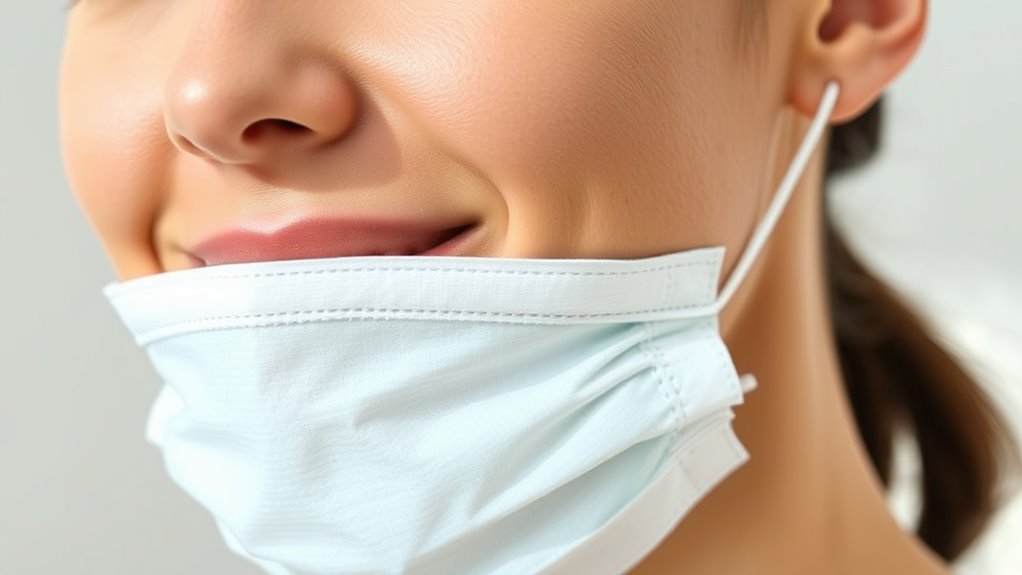
After removing your mask, it’s important to gently cleanse your skin to remove sweat, oil, and any residual skincare products. Use a mild cleanser suited for your skin type to avoid irritation. Once your skin is clean, gently pat it dry. Follow up with moisturizer application to keep your skin hydrated and restore its natural barrier, especially after wearing a mask for extended periods. If you’ve been wearing makeup, make sure to thoroughly remove it before cleansing to prevent clogged pores and breakouts. Proper makeup removal helps reduce the risk of maskne flare-ups. Avoid harsh scrubbing, which can irritate your skin. Instead, opt for soft, circular motions to maintain skin health and prepare it for future skincare routines. Regular cleansing can also help prevent skin irritation caused by trapped sweat and oils.
Over-the-Counter Treatments for Maskne
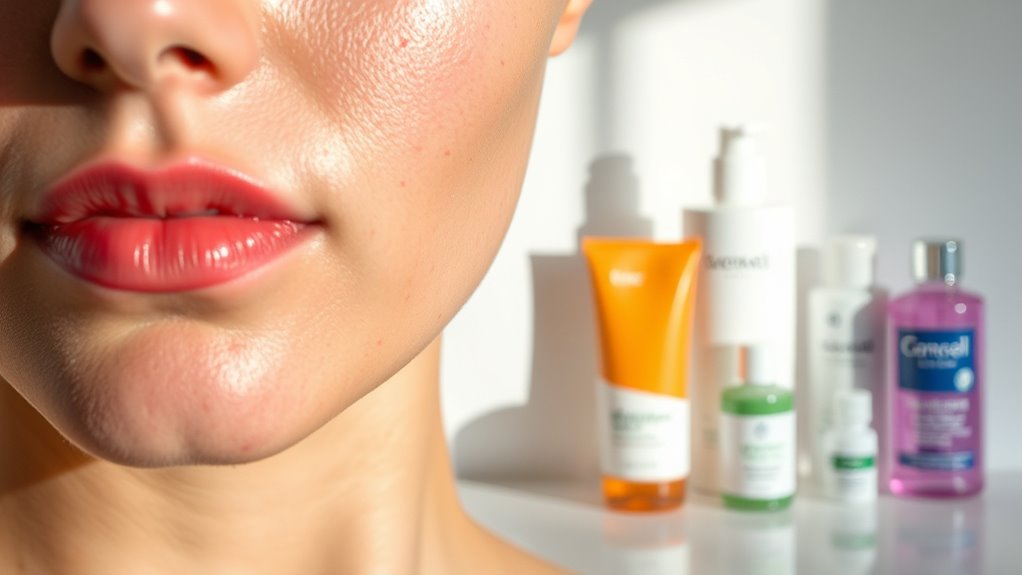
Over-the-counter treatments can be effective in managing maskne when used consistently and as directed. Look for products containing ingredients like benzoyl peroxide or salicylic acid to help reduce inflammation and clear clogged pores. You might also explore natural remedies, such as creams with herbal extracts like tea tree oil or aloe vera, which can soothe irritated skin and combat bacteria. These options often work well together with good skincare habits. Be sure to choose non-comedogenic and gentle formulations to avoid further irritation. Regular cleansing and moisturizing are essential to maximize treatment effectiveness. Remember, consistency is key—using these treatments daily will give you the best chance of clearing maskne and restoring your skin’s health.
When to Seek Professional Help
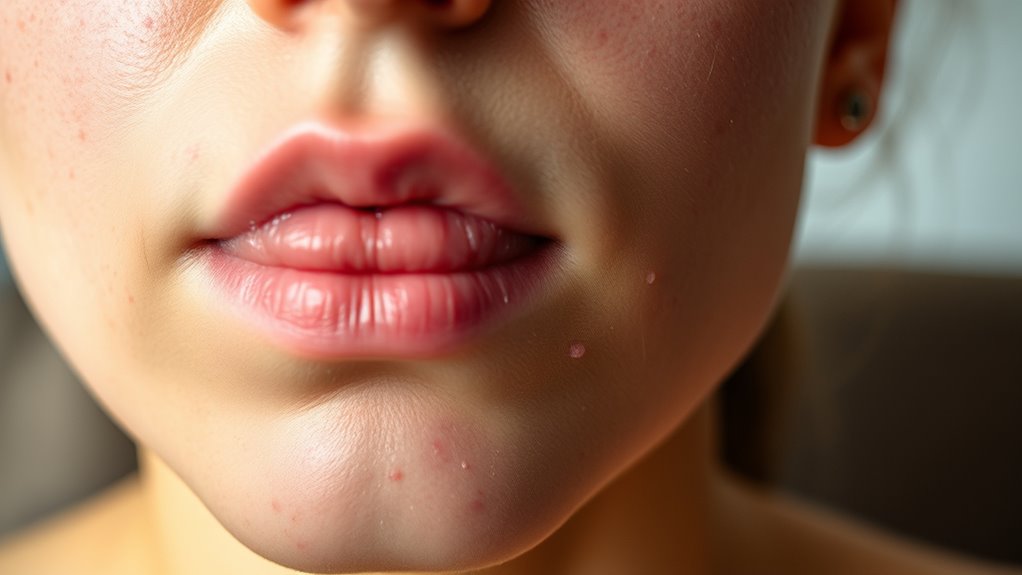
While many cases of maskne improve with consistent home treatments, you should consider seeking professional help if your skin doesn’t respond to over-the-counter remedies, if the irritation worsens, or if you notice signs of infection such as significant redness, swelling, or pus. A dermatologist consultation can help identify if your skin condition requires prescription medications or specialized treatments. Persistent symptoms that don’t improve after several weeks may indicate an underlying issue needing professional evaluation. Ignoring worsening symptoms can lead to scarring or more serious infections. If you experience intense pain, blistering, or rapid changes in your skin, it’s essential to see a healthcare provider promptly. Seeking expert advice ensures proper diagnosis and tailored treatment to effectively manage and resolve your maskne.
Lifestyle Habits to Support Clear Skin
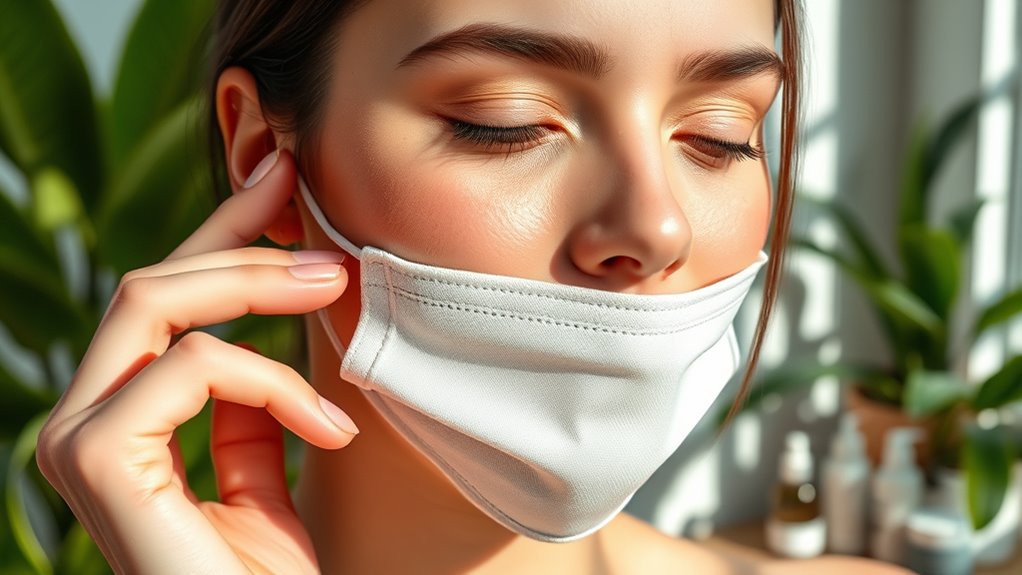
Adopting healthy lifestyle habits can substantially reduce maskne and promote clearer skin. Focus on dietary adjustments by eating balanced, nutrient-rich foods that support skin health, such as fruits, vegetables, and lean proteins. Avoid excessive sugar and processed foods, which can trigger inflammation. Managing stress is equally important, as high stress levels can increase oil production and worsen breakouts. Incorporate relaxation techniques like meditation or regular exercise to keep stress in check. Staying well-hydrated helps flush out toxins and maintains skin moisture. Additionally, get enough sleep to support skin repair and immune function. These simple lifestyle changes can complement your skincare routine, reducing the likelihood of maskne and enhancing your skin’s overall clarity.
Long-Term Strategies to Prevent Maskne

To prevent maskne over the long term, maintaining consistent skin hygiene is essential. You should also focus on proper mask usage, like washing masks regularly and avoiding tight-fitting styles. These habits help reduce irritation and keep your skin clear.
Consistent Skin Hygiene
Maintaining consistent skin hygiene is essential for preventing maskne over the long term. Regular cleansing helps remove excess oil, sweat, and dirt that can clog pores and cause breakouts. Choose gentle, fragrance-sensitive products to avoid irritation, especially if you have sensitive skin. Be cautious with fragrances, as they can trigger sensitivity and worsen skin conditions. Proper cleansing prevents pore clogging, reducing the risk of maskne formation. Avoid harsh scrubbing, which can strip skin and increase irritation. Use lukewarm water and a mild cleanser twice daily, ensuring your skin stays clean without over-drying. Consistency in your skincare routine promotes healthy skin, minimizes irritation, and keeps pores clear, creating a strong foundation for long-term maskne prevention.
Proper Mask Usage
Proper mask usage is vital for preventing maskne over the long term. Ensuring a good mask fit helps reduce friction and minimizes skin irritation, which can lead to breakouts. Avoid masks that are too tight or loose, as both can cause rubbing and sweating. Using mask accessories, like adjustable ear loops or mask brackets, can improve comfort and reduce pressure points. Regularly changing your mask, especially if it becomes damp or dirty, is essential to prevent bacteria buildup. Choose breathable fabrics to decrease sweat and moisture retention. Proper cleaning of reusable masks is crucial—wash them thoroughly after each use. By paying attention to mask fit and incorporating helpful accessories, you significantly lower your risk of developing maskne while maintaining effective protection.
Frequently Asked Questions
Can Makeup Worsen Maskne?
Makeup interaction can definitely worsen maskne if it clogs your pores. When you wear makeup under a mask, the trapped oils and sweat can lead to breakouts. Using heavy, pore-clogging products or not removing makeup properly at the end of the day increases the risk. To prevent this, opt for non-comedogenic makeup and make sure to cleanse your skin thoroughly, especially after wearing a mask.
Are There Specific Ingredients to Avoid in Skincare?
Your skin’s a battlefield, and choosing the right skincare formulations is essential. You should avoid ingredients to avoid, like heavy oils, alcohol, and fragrances, which can clog pores and irritate your skin. These harsh components act like uninvited guests, making your maskne worse. Stick to soothing, non-comedogenic products with gentle ingredients to keep your skin calm and clear, helping you fight maskne more effectively.
How Often Should I Replace My Mask?
You should replace your mask daily to maintain good mask hygiene practices and prevent skin issues like maskne. If you use reusable masks, wash them regularly, ideally after each use, using proper mask material choices like cotton, which is breathable and less irritating. Avoid sharing masks, and always wash your hands before handling them to reduce bacteria buildup. Regular replacement helps keep your skin healthy and minimizes breakouts.
Does Diet Affect Maskne Severity?
Your diet impact can influence maskne severity, as food choices affect your skin’s health. Consuming too much sugar or dairy may trigger breakouts for some people, while a balanced diet rich in fruits, vegetables, and hydration can improve your skin’s resilience. By paying attention to how certain foods affect your skin, you can better manage maskne and reduce breakouts. Adjust your food choices to promote clearer skin and minimize mask-related irritation.
Can Certain Medications Cause Maskne?
Certain medications can cause maskne as a side effect, leading to skin reactions like breakouts or irritation. You might notice acne worsening after starting new drugs, especially those with hormonal or steroid components. It’s important to check your medication’s side effects and consult your healthcare provider if you suspect your medication contributes to maskne. They can recommend alternatives or suggest skincare routines to help manage these skin reactions effectively.
Conclusion
By following these tips, you can keep maskne at bay and maintain healthy, radiant skin even in these modern times. Remember, consistency is key—think of it as your personal quest for clarity, much like a knight’s unwavering pursuit of honor. Embrace good hygiene, choose the right mask, and nurture your skin daily. With patience and care, you’ll find your skin feeling regal once more, proving that even in the age of masks, your glow can shine through.

